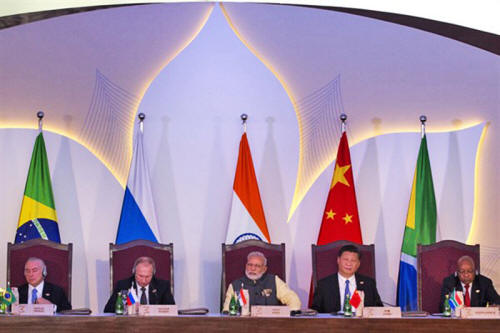|
from WPR Website
Indian Prime Minister Narendra Modi, Chinese President Xi Jinping and South African President Jacob Zuma at the BRICS summit, Goa, India, Oct. 16, 2016
(AP photo by Manish Swarup).
As recently as last year, the BRICS summit was accompanied by headlines of the challenge the grouping of major emerging economies poses to America's global position. As a coherent political bloc, the BRICS, made up of,
...was always overblown. Now it seems it has already blown over.
To be fair, Sputnik International, the Kremlin-financed Russian propaganda outfit, made a valiant effort this year to highlight the forum's "expanding clout."
But what little
other news coverage there was of the Goa summit focused on the
group's divisions, most notably India's
failed efforts to mention Pakistani terrorist groups by name in
the passage of the final communiqué condemning state-sponsored
terror, due to opposition from China.
All three welcome cooperation to advance their broader goals.
But there are natural limits to the partnerships, both bilateral and collective, that have always constrained the BRICS' potential to take on anything more than symbolic significance.
But of the three, China has the least need for the other two to pursue its interests, particularly in the Asia-Pacific.
As a coherent political bloc,the BRICS was always overblown.Now it seems it has already blown over.
As for Brazil and South Africa, both seemed like success stories during the salad days of the Rise of the Rest.
Both countries now represent more ballast
than lift for the rest of the BRICS.
And if the BRICS combined can't
wield the kind of leverage necessary to realistically unseat
Washington, their chances alone are even less encouraging.
Moscow's involvement in Syria seems as much designed to humiliate President Barack Obama as shore up Damascus.
But while some observers have
evoked a new Cold War, the current landscape more closely resembles
old-fashioned geopolitical competition for spheres of interest. And
here, Russia has greater difficulty in generating the kind of
attraction that forms the basis of solid partnerships and alliances.
And while Russia might opportunistically court
Washington's current crop of discontents, such as Turkey and Egypt,
there are limits to the kind of partnerships it will be able to
form - not least because when push comes to shove, Russia cannot
provide the financial and security backstop that the U.S. can.
But Beijing's bullying
behavior in Asia over the past several years has alarmed the very
countries it most needs to reassure about its intentions. As a
result, although the Obama administration's pivot to Asia may have
underperformed, most countries in the region are happy to balance
both powers against each other, and loathe to choose between them.
Finally, demographics do not bode well.
Socio-economically speaking, China is in a race against time to become rich before it becomes old:
In this new environment, the U.S. visibly has a harder time imposing its will in local crises and international forums.
But this is largely due to broad historical forces,
...that have changed the international landscape beyond the power of any leader or nation to withstand.
Amid all the change, though, there is one constant:
In fact, the greatest threat to America's global standing is not the machinations of Vladimir Putin or Xi Jinping, or the chaos stalking the Middle East. Rather, it is the 'myopia' of a portion of the American public that seems to think the country has entered a dark tailspin from which it requires saving.
Nothing could be further from 'the truth'...
|


